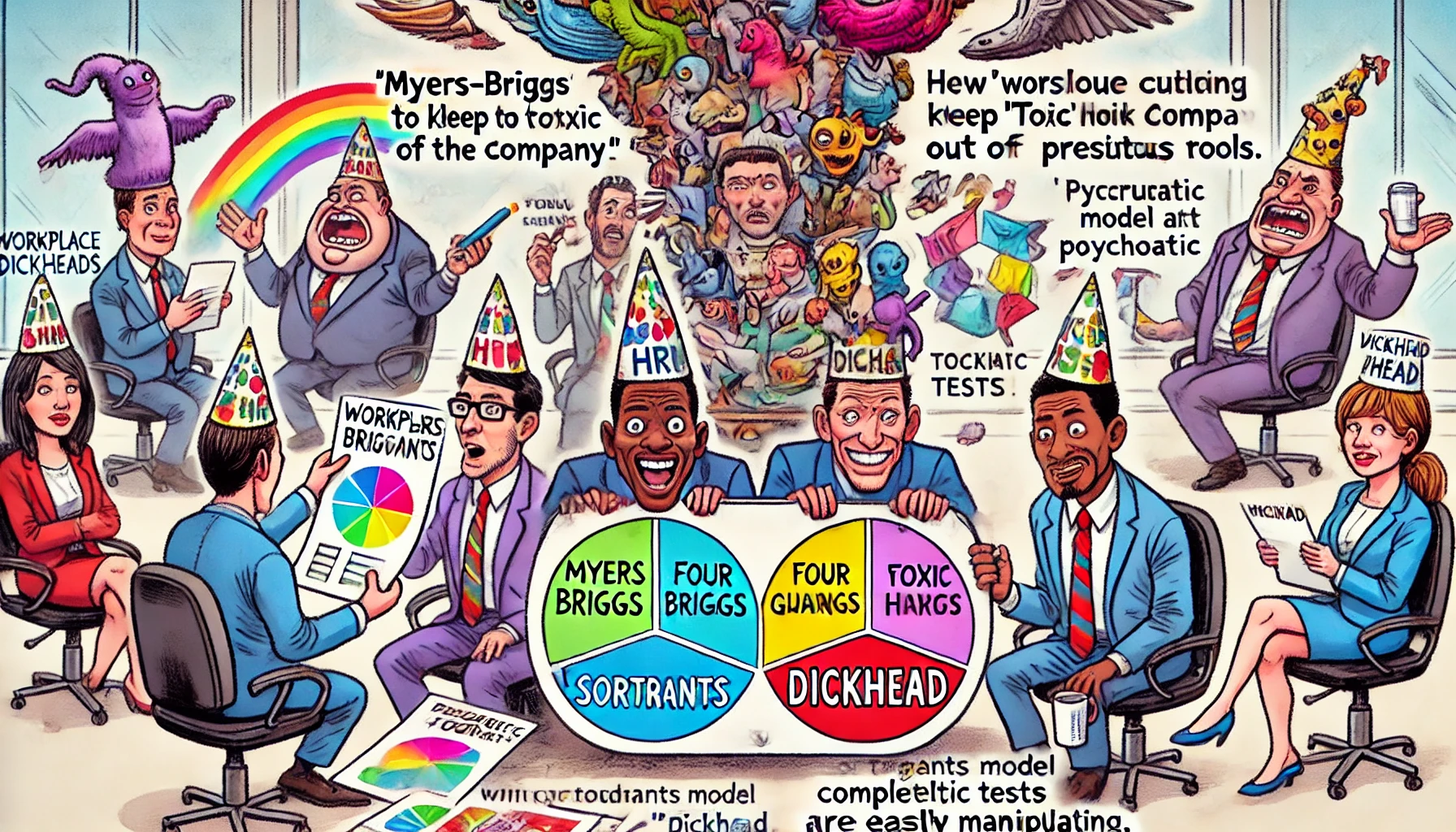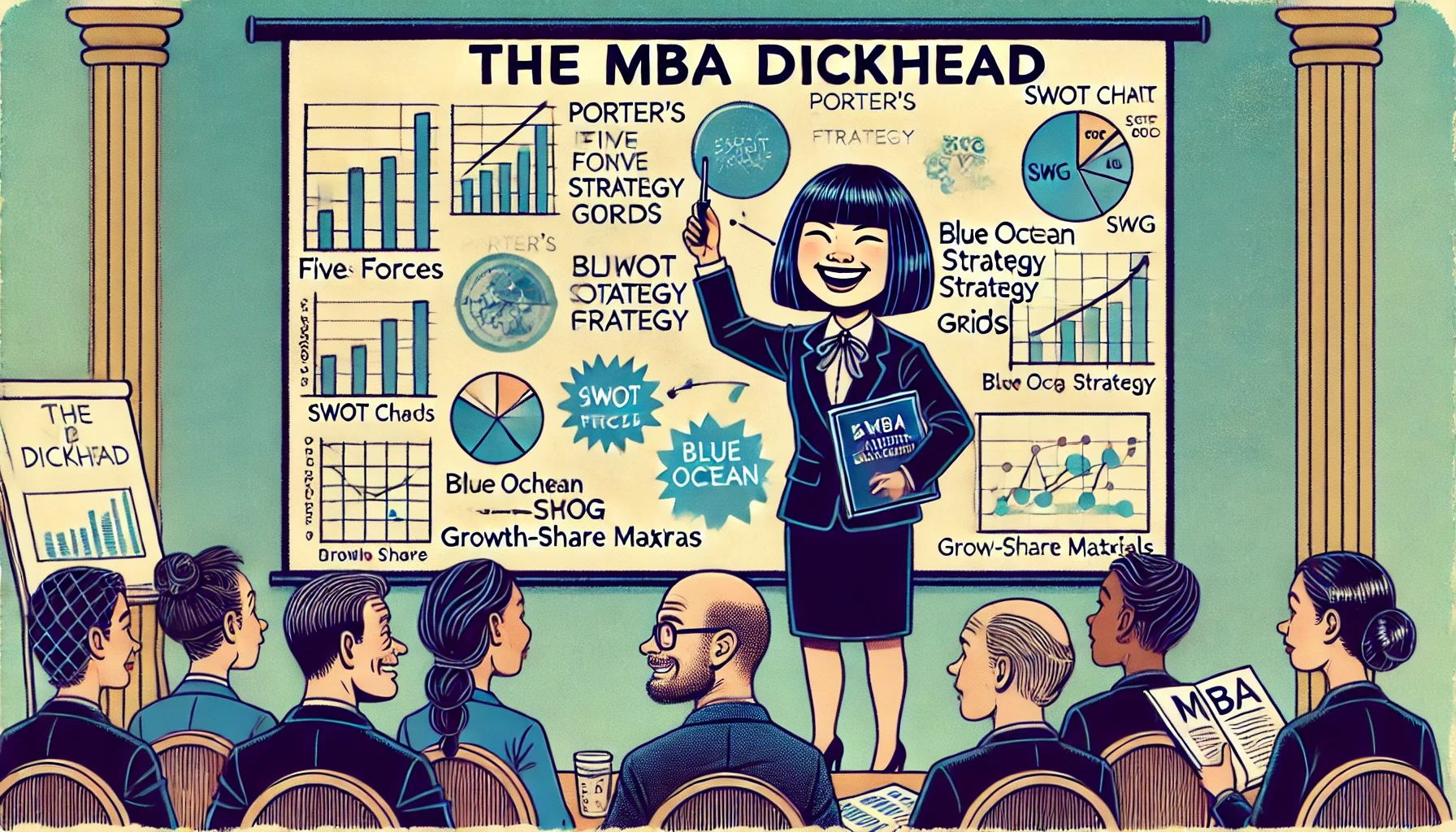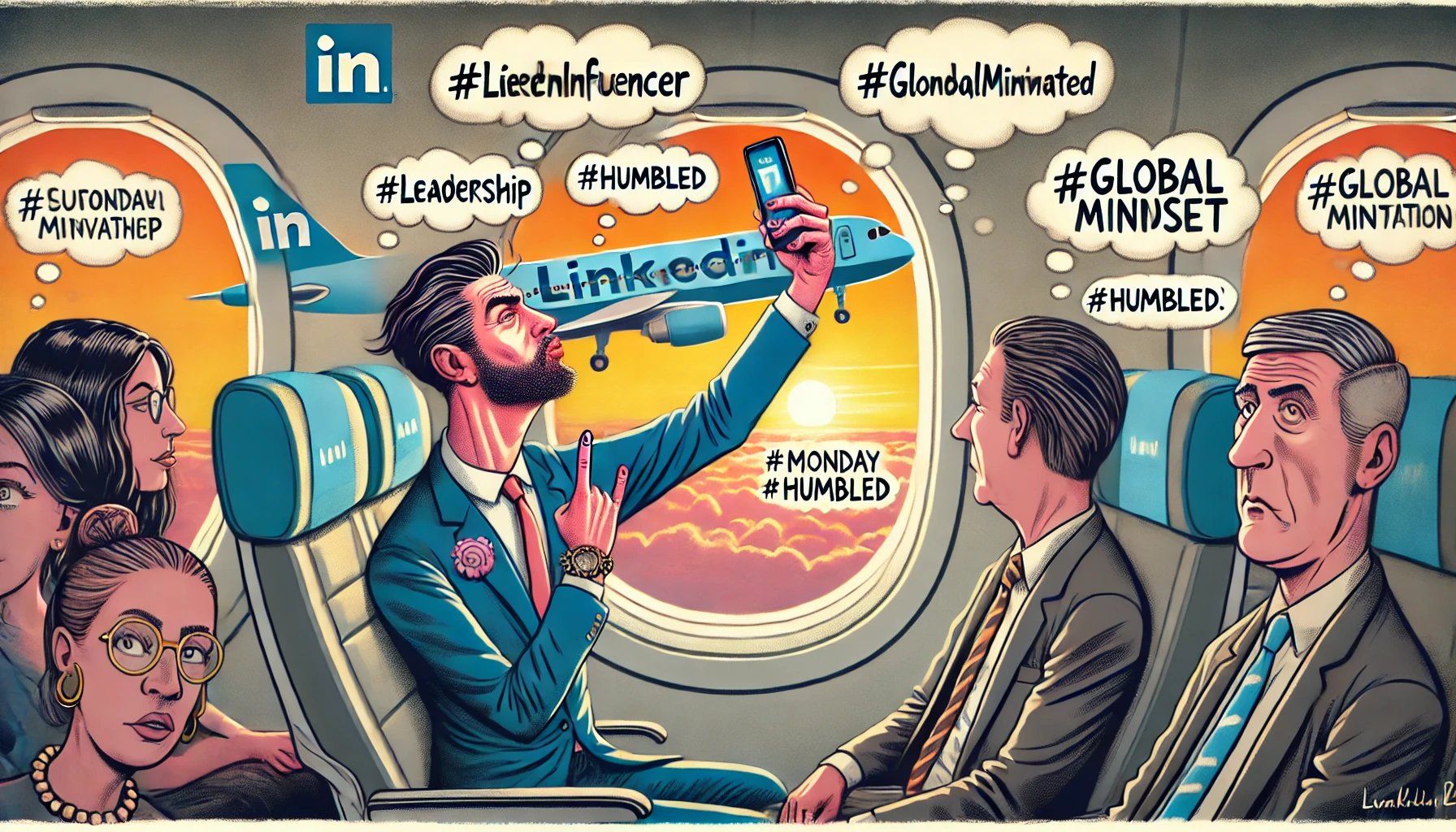Introduction
HR departments have waged a long, futile war against the Workplace Dickhead – that toxic employee who somehow survives every hiring filter. Armed with an array of shiny recruitment tools like personality tests, psychometric evaluations, and cleverly crafted interview questions, HR’s mission is to spot and eliminate these ticking time bombs before they join the company. It sounds great in theory, except for one tiny problem: none of it actually works. Despite the high-tech quizzes and behavioral interrogations, office dickheads continue to slip through hiring rounds like cockroaches sneaking under a door. The result? HR is left scratching their heads (and polishing their tools) while yet another narcissistic tormentor raids the break room and terrorizes the Monday meeting.
The Useless Arsenal
HR’s hiring arsenal is overflowing with assessments that promise to weed out bad apples but in reality do about as much good as a fortune cookie at a job interview. They administer famous personality tests as if these were crystal balls, and they swear by colorful charts that sort people into neat little boxes. From pseudoscientific questionnaires to gimmicky exercises, here are some of the shiny tools HR loves – and why they do absolutely nothing to detect corporate dickheads:
- Myers-Briggs Type Indicator (MBTI): The astrology of the business world, beloved by managers who probably still check horoscopes. The MBTI sorts people into cutesy personality types (ENJF? INFP? WTF?) as if a four-letter code reveals whether someone is secretly a jerk. Spoiler: labeling someone an “Assertive Architect” or “Mediating Diplomat” doesn’t predict if they’ll steal your lunch or credit for your work. It’s a corporate zodiac – fun for team-building fluff, useless for spotting sociopaths.
- The Four Quadrants Model: This is the one where everyone becomes a color or an animal. (“Congrats, you’re a Blue Dolphin, which means you’re friendly!”) It arbitrarily boxes people into quadrants – often with snazzy labels like Driver/Analyst/Amiable/Expressive or some menagerie of eagles, beavers, and golden retrievers. Somehow, “Raging Office Narcissist” never made it onto the color wheel or spirit animal list. You can be a red “Commander” or a yellow “Inspirer,” but if you’re a backstabbing egomaniac, this test will happily tag you as a visionary orange tiger and call it a day.
- “Cultural Fit” Interviews: Ah, the grand echo chamber maker. Cultural fit interviews are basically a process of hiring clones of existing employees. The goal is to see if a candidate’s vibe matches the company’s “core values”(read: will you pretend to enjoy our bland office culture?). In practice, it’s a great way to ensure groupthinkflourishes and any hint of diversity of thought is squashed. The interviewer nods approvingly if you think exactly like the team. A smooth-talking toxic candidate who parrots the company lingo and sports the same hobbies as the boss will sail through with flying colors. Meanwhile, Jesus himself could apply and get rejected for not “fitting in” if he doesn’t play ping-pong or drink the corporate Kool-Aid.
- The LinkedIn Thought Leadership Score™: (New from the HR Innovation Lab) – Because nothing says “great hire” like a high score on LinkedIn’s vanity metrics. This absurd test tallies how many self-congratulatory “Thought Leader” posts and inspirational quote memes a candidate has shared online. Did they get 500+ likes for regurgitating buzzwords about “disrupting synergy paradigms”? Hire them immediately! 😜 In reality, all this proves is that the candidate has plenty of time to waste on LinkedIn – not that they won’t toxify your team.
- The Buzzword Fluency Exam: Ever worry your new hire won’t know their “circle back” from their “growth hacking”? Fear not – the Buzzword Fluency Exam is here. This test rewards candidates for stringing together as many corporate buzzwords as possible in under a minute. If someone can say, “I proactively leverage agile synergy to drive ideation in a paradigm shift,” without choking, they get an A+. Unfortunately, mastering buzzwords only proves they can speak fluent BS. A professional BS-er is exactly what a hidden dickhead aspires to be – and this exam practically hands them a diploma in it.
Why Dickheads Always Win
So, with all these fancy assessments, how do the dickheads keep landing the job? The answer is simple: manipulative candidates easily game the system. These toxic hopefuls treat the hiring process like a role-playing game – and they’ve studied all the cheat codes. By the time Mr. Future Office Jerk sits for the test, he already knows the “correct” answers to every personality quiz question (“Would you describe yourself as a team player?” Absolutely!). He can pick the ideal choice on a psychometric evaluation in his sleep. Rather than revealing his true colors, he’s choosing answers like a politician courting votes. The result? The assessment paints him as a model collaborator with a heart of gold, instead of the backstabbing goblin he truly is.
In the interview, the prospective dickhead turns up the charm to 11. For a solid 30 minutes, anyone can act like Mother Teresa – and these folks are Oscar-worthy performers. They flash a friendly smile, wax poetic about “embracing feedback”, and sprinkle in just enough flattery about the company’s vision to make the interviewer glow. They’ll enthusiastically agree with every bland corporate value (“Integrity is my middle name, sir!”) and even toss in a personal tale about that one time they heroically resolved a team conflict at their last job. It’s all an act. Like a wolf in business-casual clothing, they masquerade as the perfect sheep just long enough to get the keys to the henhouse.
The sad truth is traditional hiring tools test how well you take tests – not who you really are. A clever dickhead knows how to tell people exactly what they want to hear. Psychopaths and narcissists, in fact, often excel in interviews because they’re naturally adept at manipulation and shameless self-promotion. HR’s beloved assessments are simply no match for a determined pretender. While the nice, honest candidates are busy overthinking their answers (“I want to be truthful about my weaknesses…”), the toxic ones are crafting a flawless façade. By the time HR realizes Dr. Jekyll is actually Mr. Hyde, it’s too late – he’s already signed the contract and has an employee ID badge (probably with a smug grin on it).
The Flawed Fixes
So the dickhead made it through the fortress gates – now inside the company, wreaking quiet havoc. But fear not, HR has post-hiring tactics to reform these bad hires! Cue the eye-roll. Once the toxic employee starts showing their true colors (micromanaging here, belittling there), management’s solution is often to send them to leadership development programs or schedule some 360-degree feedback sessions. The theory: train or review the dickhead into a decent human being. The reality: you can’t workshop away a jerk.
“Leadership training” for a toxic hire is like sending a shark to a dolphin friendliness seminar. They’ll sit through the PowerPoint slides about empathy, maybe role-play a listening exercise or two, then promptly go back to eating all the other fish. Sure, they’ll collect a nice certificate of completion (suitable for framing on their desk next to their oversized ego), but don’t expect a miraculous personality transplant. You can lead a dickhead to training, but you can’t make them care.
And how about 360-degree feedback, that magical process where subordinates, peers, and bosses all get to weigh in? In theory it’s meant to give the jerk a panoramic view of their flaws. In practice, it’s either too watered-down to matter or brutally honest but promptly ignored. If feedback is anonymous, the dickhead will dismiss the criticisms as “jealous haters” who don’t appreciate his greatness. If it’s face-to-face, good luck finding colleagues willing to tell Tony Toxic how awful he is — they’ve seen what happens to messengers bearing bad news. Often, the outcome of a 360 review is that the toxic employee learns who their enemies are and plots revenge, while higher-ups file the feedback under “needs improvement” and move on. Meanwhile, our workplace dickhead continues his merry rampage, unchecked and maybe even emboldened (“They had a meeting about my behavior and I’m still here? Must mean I’m untouchable!”).
The corporate flawed fixes don’t stop there. Some companies try mentorship programs, pairing the troublemaker with a senior leader in hopes they’ll rub off some wisdom. (More likely, the senior leader ends up as a new pawn in the jerk’s game of office politics.) Others rely on Performance Improvement Plans (PIPs) – essentially written warnings saying “be nicer or else.” The dickhead, ever the strategist, will play along just enough to get the HR police off their back. They might dial down the overt nastiness for a month or two, check the required boxes, then once the spotlight fades, it’s back to business-as-usual terrorizing. At worst, they’ve now mastered the art of covering their tracks, making future bad behavior harder to catch.
In a just world, these post-hiring interventions would reform or expel the toxic bullies. In reality, they’re Band-Aids on a bullet wound. Despite HR’s attempts at rehabilitation, the workplace dickhead often fails upward – riding their inflated reputation and political savvy into promotions, while everyone who actually had to work with them looks on in despair.
The Inevitable Conclusion
After all the tests, interviews, trainings and feedback sessions, here we are: the corporate dickhead is alive and well, occupying a corner office and driving another team to therapy. The conclusion is as inevitable as a badly catered meeting: HR’s tactics will never truly eliminate these people. No matter how many personality inventories you deploy or how sophisticated your hiring algorithms become, the determined office jerk will find a way to beat the system. They’re like workplace Terminators – you can’t stop them, you can only hope to contain them (temporarily).
Why will dickheads always thrive? Because the very qualities HR tries to measure – honesty, teamwork, integrity – are the exact qualities a toxic person is willing and able to fake with a smile. Meanwhile, the qualities that make someone a destructive force – deceit, narcissism, lack of empathy – aren’t on any multiple-choice questionnaire. HR’s shiny tools are aimed at the ideal candidate; the dickhead presents himself as that ideal, then reveals his true form when those tools are long put away. It’s a grand game of Whac-A-Mole: every time HR thinks they’ve whacked one (with a new test or policy), another pops up wearing a friendly mask and a firm handshake.
In the end, the harsh reality is that we’re never going to have a 100% jerk-free workplace. Sure, companies can improve hiring processes with better reference checks, trial periods, or by actually valuing emotional intelligence over buzzword bingo. But as long as humans are doing the hiring, other crafty humans will figure out how to game the system. HR will keep rolling out new silver-bullet assessments, and dickheads will keep ducking and weaving right past them.
So next time you encounter a colleague who’s a total dickhead and wonder “How on earth did they get hired?”, remember: they likely aced an MBTI, charmed a panel of interviewers, mastered the buzzword exam, and even sat through leadership training with a grin. HR did their best – and that’s exactly why he’s here. In the immortal words of the sages (okay, maybe it was just a jaded HR rep): “You can’t spell hiring without HR, and you can’t spell dickheadwithout… actually, never mind.” The war against workplace dickheads rages on – and alas, the dickheads are winning.



